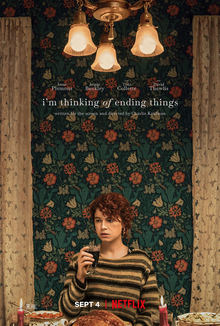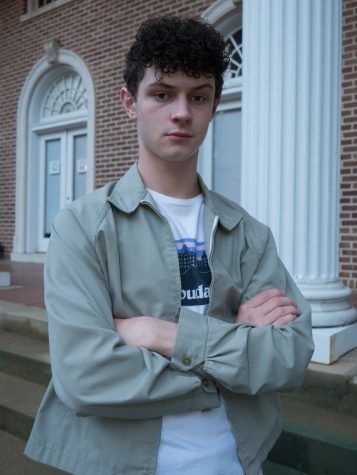‘I’m Thinking of Ending Things’: Surreal, yet all too real

“I’m Thinking of Ending Things” takes viewers on an eerie journey to a family farm.
September 15, 2020
You know the feeling you get when you walk around your school at night time? What about waking up to get a glass of water while visiting your grandparents? Have you ever contemplated existence on a long night time car ride where you just couldn’t fall asleep? If you answered ‘yes’ to any of these questions, then you know exactly what it feels like to watch Charlie Kaufman’s newest film “I’m Thinking of Ending Things,” based on the novel by Iain Reid. The movie manages to perfectly capture all of these feelings, which are highly reminiscent of the recent phenomenon of “liminal spaces,” while also delivering on the patented Kaufman existentialism film fans have come to love and expect.
The film begins simply enough, telling the story of a young woman (Jessie Buckley) who goes on a road trip with her new boyfriend, Jake (Jesse Plemmons), to visit his parents. We learn through narration, taking the form of the young woman’s inner thoughts, that she is “thinking of ending things” with Jake. As she reflects on how and why she has come to this decision, her thoughts are repeatedly interrupted by Jake trying to make conversation, creating an awkward and uncomfortable environment that perfectly captures what it’s like to lose interest in a relationship. Their conversation ranges from poetry to musicals, each line deliberately chosen to either illuminate something about their characters or to foreshadow later events.
After arriving at Jake’s childhood home, the levels of unease and discomfort continue to rise as we are introduced to Jake’s mother and father (Toni Collette and David Thewlis, respectively). Following one of the most uncomfortable dinner scenes in recent memory, the movie becomes increasingly abstract as Kaufman warps the viewer’s perception of time and reality. There is a certain unnerving dread that permeates the rest of the second act, a disquieting notion that nothing is quite right. As the viewer is led through the story, pieces start to fall into place, revealing more and more of what Jake’s childhood was like, and subtle hints at the true nature of the story start to arise. While the experimental nature of the plot can be confusing at times, the moment of realization when everything starts to make sense is far more gratifying because of it.
The film deals with themes such as the inevitability of aging and death, as well as what it feels like to live life without a sense of purpose. The unsettling, dream-like quality of the film lends perfectly to these themes, as they represent very real fears faced by people from many different backgrounds. The universality of this fear is what makes the film so effective, as it exploits the viewer’s own personal existential dread and portrays these emotions in a hauntingly beautiful manner. Isn’t it fun?
The cinematography serves this dream like nature exceedingly well, turning ordinary locations, like an ice-cream store, into otherworldly, ethereal realms. Many of the images onscreen are reminiscent of the works of film photographers such as Gregory Crewdson and exude the same lonely energy as the paintings of Edward Hopper. The visuals guide the viewer through the story and aid in drawing out the emotions Kaufman is trying to tap into.
While “I’m Thinking of Ending Things” likely won’t be everyone’s cup of tea, fans of Kaufman’s previous work as well as fans of surrealism and existentialism in general, will be delighted with the brilliant terror the film manages to convey. If questioning your individuality and your life’s meaning sounds fun to you, “I’m Thinking of Ending Things” will be right up your alley.









Jillian Snodgrass • Sep 15, 2020 at 8:06 pm
Great article! Definitely need to put this on my to-watch list!